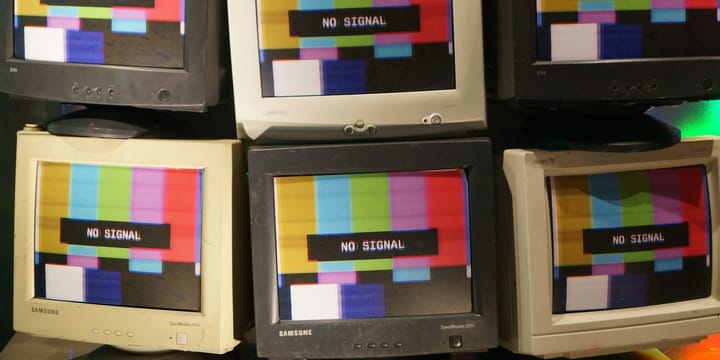If It Breaks Wikipedia, It’s Probably Bad Policy
One Simple Test to Try Before Regulating the Internet.

By Audrey Hingle
Does bad internet policy have a tell? In 2023 IX's Mallory Knodel proposed what she called the “Wikipedia Test.” It was a straightforward principle: if your regulation makes it harder for Wikipedia to exist, it's probably not good regulation. It challenged policymakers to consider the unintended consequences of laws aimed at commercial platforms. Because Wikipedia, like many open, community-led projects, represents the best of the internet: collaborative, transparent, and built for the public good.
Now, that idea has been formalized. The Wikimedia Foundation has published The Wikipedia Test: a practical tool for assessing whether proposed laws protect or threaten the digital commons by evaluating their impact on open, community-led projects like Wikipedia.
When Good Intentions Break Good Platforms
Here’s the problem: Many well-intentioned laws aimed at regulating commercial platforms can unintentionally threaten nonprofit, volunteer-driven spaces. These are platforms that don’t collect personal data, don’t sell ads, and don’t algorithmically amplify content for profit. But they still risk being swept up in laws that fail to distinguish between the commercial and the public-interest web.Take the UK’s Online Safety Act. It was designed to regulate major commercial platforms like Facebook and TikTok, but its sweeping scope could apply to Wikipedia, triggering requirements like user identity verification and moderation tools. Or look at efforts to weaken Section 230 protections in the United States. This could expose Wikipedia and other open projects to legal liability for user contributions, threatening the core models that enable community-led editing and moderation.
The Wikipedia Test centers around a simple question: Would this law make it harder for people to access, contribute to, or trust a platform like Wikipedia?
When we say “Wikipedia,” we don’t just mean Wikipedia. The test treats it as a stand-in for a broader set of online spaces that share core values: openness, privacy, community governance, and the free exchange of knowledge. That includes projects like Project Gutenberg, OpenStreetMap, FixMyStreet, and countless open data repositories and scientific archives. These projects are critical to education, civic engagement, and innovation, and they often rely on legal protections and platform design choices that don’t fit commercial models.
The Wikipedia Test Rubric
To make this idea concrete, the Wikimedia Foundation has developed a short rubric that identifies common red flags in proposed legislation. It asks: Could the policy...
- Increase the legal risks or costs of hosting community-led public interest projects like Wikipedia?
- Make it harder to access or share information, including works that are freely licensed, protected by copyright, or in the public domain?
- Threaten user privacy by requiring the collection of sensitive, identifiable information such as ages, real names, or contact details of Wikipedia’s volunteer editors and readers?
- Enable surveillance that discourages people from reading or editing Wikipedia?
- Increase the risk for people who contribute to or access Wikipedia by enabling governments to collect identifying information, leading to intimidation or retaliation?
- Undermine the ability of volunteer editors to govern Wikipedia’s content and community guidelines?
- Restrict the free flow of information across borders, limiting access to Wikipedia and its content?
Each of these questions is rooted in real-world policy examples, from mass surveillance programs that chilled Wikipedia readership, to content moderation laws that ignore nonprofit models, to international treaties that enable cross-border data access by authoritarian governments.
The Wikipedia Test isn’t a pass/fail tool. It’s a starting point for dialogue, a way to surface harms early, prompt better questions, and support laws that protect the internet’s role as a public good.
📘 Read the full Wikipedia Test, see the criteria, and explore case studies: https://wikimediafoundation.org/news/2025/06/27/the-wikipedia-test
Summer of Convenings: Public Interest Tech Takes the Stage
It’s summer, and that means it’s convening season. This week was a big one, with major gatherings bringing together thinkers and doers across internet governance and responsible technology. IX’s own Mallory Knodel joined the “Tech for Society” panel at The Tech People Want Online Summit, alongside speakers from Xnet, the Austrian Institute of Technology, and others. The session explored how digital tools can help bridge divides, foster collective action, and support reconciliation efforts at a human scale. Meanwhile, the UN’s AI for Good Summit and the WSIS+20 Forum kept the global internet governance calendar packed.
Did you speak on a panel or attend a session that sparked a fresh idea? We’d love to help you turn it into an article to share with the IX community. Get in touch with us editor@exchangepoint.tech.
Support the Internet Exchange
If you find our emails useful, consider becoming a paid subscriber! You'll get access to our members-only Signal community where we share ideas, discuss upcoming topics, and exchange links. Paid subscribers can also leave comments on posts and enjoy a warm, fuzzy feeling.
Not ready for a long-term commitment? You can always leave us a tip.
From the Group Chat 👥 💬
Jack Dorsey has launched a new messaging app called Bitchat, a Bluetooth-based, off-grid alternative to WhatsApp that stores no data, requires no accounts, and works without the internet. It is being pitched as a privacy-first, censorship-resistant tool for peer-to-peer communication. CNBC covered the launch with uncritical enthusiasm, but security researchers quickly found serious issues. The app's identity system is mostly cosmetic, leaving it open to basic man-in-the-middle attacks.
And with a range that maxes out in your local coffee shop, is this really a censorship workaround?
In an era when people can vibe code a "secure" app in a weekend, maybe the press could wait until someone checks if it actually works before writing it up like the future of communication?
This Week's Links
Internet Governance
- The EU’s new ProtectEU roadmap revives a familiar and fraught push to weaken encryption in the name of “lawful access,” drawing sharp warnings from privacy advocates who say it opens the door to dangerous vulnerabilities and a surveillance regime no one asked for. https://www.techradar.com/vpn/vpn-privacy-security/the-eu-wants-to-decrypt-your-private-data-by-2030
- The roadmap in question. https://eur-lex.europa.eu/legal-content/EN/TXT/PDF/?uri=CELEX:52025DC0349
- Joint Statement by National and Regional Initiatives (NRIs), Technical Community and Civil Society Organisations (CSOs) for the WSIS+20 Consultation: Dozens of NRIs, CSOs, and ISOC chapters have joined this call to strengthen the IGF and uphold the multistakeholder model. https://docs.google.com/document/d/1xn1VLYp3vakmizjhaoOlt_b1akEmLJdmfHNISeCYtmo/edit?tab=t.0
- To add your name, send a quick email to info@youthigf.de
- As platforms deepen ties with political power, Renee DiResta and Richard Reisman explore how tech CEOs are reshaping global governance, regulation, and public discourse. https://www.persuasion.community/p/how-to-reclaim-social-media-from
- Former US diplomats sound the alarm as Secretary of State Marco Rubio moves to dismantle the State Department’s human rights programs, gutting an agenda he once helped build. https://www.latimes.com/opinion/story/2025-07-03/state-department-human-rights-marco-rubio
- In armed conflict, digital connectivity becomes a lifeline and disruptions to internet and telecommunications networks are matters of life and death. Analysis by ICRC legal adviser Tilman Rodenhäuser. https://blogs.icrc.org/law-and-policy/2025/07/03/international-humanitarian-law-and-connectivity-disruptions-during-armed-conflict/
- Google has been hit by an EU antitrust complaint over its AI Overviews from a group of independent publishers. https://www.reuters.com/legal/litigation/googles-ai-overviews-hit-by-eu-antitrust-complaint-independent-publishers-2025-07-04
- After hosting the G7’s strong statement against transnational repression, Canada risks hypocrisy if its own Bill C‑2 on foreign agents fails to protect the very dissidents it just pledged to defend. https://www.theglobeandmail.com/opinion/article-g7-transnational-repression-bill-c-2-carney
- A new regulation from the Supreme Court in Brazil holds Meta, X, and other online platforms accountable for content and user safety, setting Brazil on a collision course with the Trump administration. https://restofworld.org/2025/brazil-social-media-content-ruling
- Read and subscribe to the AI Standardisation Inclusiveness Newsletter, now regularly published by the Task Group (TG) Inclusiveness created within the CEN-CENELEC Joint Technical Committee 21, responsible for standardisation as per the EU AI Act. https://www.etuc.org/en/artificial-intelligence-standardisation-inclusiveness-newsletter
- Eric Bailey hired a voice actor to read RFC 2119. LOL. https://ericwbailey.website/published/you-must-listen-to-rfc-2119
Digital Rights
- Amid Gaza’s devastated digital infrastructure, Palestinians turned to social media to tell their stories, survive, document, and resist. 7amleh’s new position paper reveals how platforms became vital tools, and the toll of censorship and algorithmic suppression. https://7amleh.org/post/7amleh-releases-new-position-paper:-%E2%80%9Cthe-war-on-gaza:-how-social-media-constructed-narratives-and-solidarity-among-gazans%E2%80%9D
- Practical application of the Guiding Principles on Business and Human Rights to the activities of technology companies, including activities relating to artificial intelligence - Report of the Office of the United Nations High Commissioner for Human Rights. https://www.ohchr.org/en/documents/thematic-reports/ahrc5932-practical-application-guiding-principles-business-and-human
- Artificial intelligence procurement and deployment: ensuring alignment with the Guiding Principles on Business and Human Rights - Report of the Working Group on the issue of human rights and transnational corporations and other business enterprises. https://www.ohchr.org/en/documents/thematic-reports/ahrc5953-artificial-intelligence-procurement-and-deployment-ensuring
Technology for Society
- A new article published by Tech for Palestine details how Google’s billion-dollar investments and hiring practices are deeply intertwined with Israel’s military intelligence units, raising urgent questions about Silicon Valley’s role in surveillance, war, and occupation. https://updates.techforpalestine.org/the-deep-ties-between-google-and-the-israeli-military
- Funding feminist digital spaces is essential to building safer, more just online futures says analysis by Tesmerelna Atsbeha, Amy Bisno, jac sm kee, and Jan Moolman. https://www.alliancemagazine.org/analysis/if-feminist-philanthropy-wants-to-build-a-better-world-it-needs-to-move-online
- Kenyan tech firm Siscom has unveiled a new investment platform that allows ordinary citizens, saccos and small businesses to co-own high-performance servers. https://www-standardmedia-co-ke.cdn.ampproject.org/c/s/www.standardmedia.co.ke/amp/business/sci-tech/article/2001523325/kenyan-tech-firm-launches-platform-for-people-to-co-own-cloud-servers
- With billions online and AI transforming digital spaces, trust and safety is no longer just content moderation, it’s a booming $24.8B industry shaping the future of platforms, regulation, and user trust, finds new market research from Duco. https://app.ducoexperts.com/tsreport
- Sursiendo and May First explore how community tech can serve environmental justice—read their new report on sustainable, autonomous internet infrastructure and what it’ll take to build it. https://sursiendo.org/2025/07/actions-for-environmental-justice-from-autonomous-and-community-based-technological-infrastructures
- In a delightfully nerdy blog, Terence Eden shows how you can track the International Space Station using DNS LOC records. https://shkspr.mobi/blog/2025/07/get-the-location-of-the-iss-using-dns
- A Maine police department's attempt to add their logo to a drug bust photo backfired spectacularly when citizens caught them lying about using artificial intelligence to alter evidence photos. https://boingboing-net.cdn.ampproject.org/c/s/boingboing.net/2025/07/02/maine-police-caught-lying-about-using-ai-to-alter-drug-bust-photo.html/amp
- Learn how to make the web more accessible with practical tips from Brazil’s new ABNT standard. Watch the full workshop recording. https://www.youtube.com/watch?v=6QBatPkU0Zk
- A new blended training programme for ICT network managers is putting communities at the centre of Africa’s digital inclusion efforts. https://www.apc.org/en/news/communities-centre-africa-launches-groundbreaking-training-ict-network-managers
Privacy and Security
- China has established its first ultra-secure quantum communication link in the southern hemisphere, connecting Beijing and South Africa using satellite-based quantum key distribution. https://thequantuminsider.com/2025/03/14/china-established-quantum-secure-communication-links-with-south-africa
- Phoenix R&D has fused TLS and MLS into a hybrid protocol to improve encrypted communication for long-running connections, post-quantum security, and flexible authentication. https://blog.phnx.im/combining-tls-and-mls-experiment
- Surveillance Watch just added new visualization features—including Sankey diagrams to show how funds flow through surveillance systems. https://www.surveillancewatch.io
- Human trafficking tied to online scam centers is spreading across the globe, according to a new crime trend update from INTERPOL. https://www.helpnetsecurity.com/2025/07/01/interpol-human-trafficking-scam-centers
- AT&T is rolling out a protection that prevents unauthorized changes to mobile accounts as the carrier attempts to fight a costly form of account hijacking. https://arstechnica.com/security/2025/07/att-rolls-out-wireless-account-lock-protection-to-curb-the-sim-swap-scourge
- IODA (Internet Outage Detection and Analysis) released animated explainer videos to help users better understand how its signals work and interpret disruption data more accurately. https://ioda.inetintel.cc.gatech.edu/reports/watch-iodas-animation-videos-understanding-internet-connectivity-one-signal-at-a-time
- RightsCon has released its 2025 Outcomes Report, capturing key takeaways, new coalitions, and the road ahead for digital rights after four days of dialogue in Taipei. https://www.rightscon.org/rc25-outcomes-report
- A team created by Director of National Intelligence Tulsi Gabbard has sought access to emails and chat logs of the largest US spy agencies to root out “weaponization” and enforce Trump’s agenda. https://www.washingtonpost.com/national-security/2025/07/08/gabbard-dig-odni-weaponization-intelligence
- ICYMI: A related story from May, the US intelligence community has been buying sensitive personal data that would have previously required a court order, essentially bypassing the Fourth Amendment, but now there's too much to manage from too many corporations and brokers. So the government plans to build a one-stop shop for spy agencies to access it all. https://theintercept.com/2025/05/22/intel-agencies-buying-data-portal-privacy
Upcoming Events
- Supporting Authorized Access to Information Act (SAAIA) Information Session Civil Society and Academics from Public Safety Canada. Online. 2pm EST. https://events.teams.microsoft.com/event/d24d7887-1f95-4d26-b082-ffd1e4d7e938@2d28dd40-a4f2-4317-a351-bc709c183c85
- Privacy Enhancing Technologys Symposium. July 14-19. Washington DC and online. https://petsymposium.org/2025/program.php
Careers and Funding Opportunities
- Center for Democracy and Technology. Washington, DC preferred. https://cdt.org/ai-governance-fellow
- Omidyar Network: Principal, Programs (Technology Policy). Washington, DC. https://job-boards.greenhouse.io/omidyarnetwork/jobs/6952324
- Knight Foundation: Associate/Information & Society. Miami, FL. https://knightfoundation.org/about/employment/associate-information-society
- Johns Hopkins University: Postdoctoral Fellow - Normativity Lab. Baltimore, MD. https://apply.interfolio.com/168130
- The University of Pennsylvania: Communications and Research Manager - Penn Center for Media, Technology, and Democracy. Philadelphia, PA. https://wd1.myworkdaysite.com/recruiting/upenn/careers-at-penn/job/Amy-Gutmann-Hall/Communications-and-Research-Manager---Penn-Center-for-Media--Technology--and-Democracy_JR00107808
- Microsoft: Senior Director, Chief Economist - AI for Good Lab. Redmond, WA. https://jobs.careers.microsoft.com/global/en/job/1829742/Senior-Director%2c-Chief-Economist---AI-for-Good-Lab
- Pulitzer Center: Call for Proposals for Pulitzer Center’s AI Accountability Fellowships (2025-2026). Remote. https://pulitzercenter.org/blog/open-call-proposals-pulitzer-centers-ai-accountability-fellowships-2025-2026
- GovAI:
- Winter Fellowship 2026. London, UK. https://www.governance.ai/post/winter-fellowship-2026
- Research Fellow. London, UK preferred. https://www.governance.ai/post/research-fellow
- Research Scholar. London, UK preferred. https://www.governance.ai/post/research-scholar
Opportunities to Get Involved
- Share your views: Consulting Canadians on a possible Canada-European Union Digital Trade Agreement. Consultation closes August 23. https://international.canada.ca/en/global-affairs/consultations/trade/2025-06-23-digital-trade
- #PrivacyCamp25: Call for Sessions open. Apply by July 21. https://privacycamp.eu/2025/07/02/privacycamp25-call-for-sessions-open
- This Call for Proposals for technology-facilitated gender-based violence aims to select a consortium of French and/or international and/or national feminist CSOs from partner countries of France's development policy. Closing date August 31. https://www.afd.fr/en/calls-for-projects/call-projects-technology-facilitated-gender-based-violence
What did we miss? Please send us a reply or write to editor@exchangepoint.tech.




Comments ()